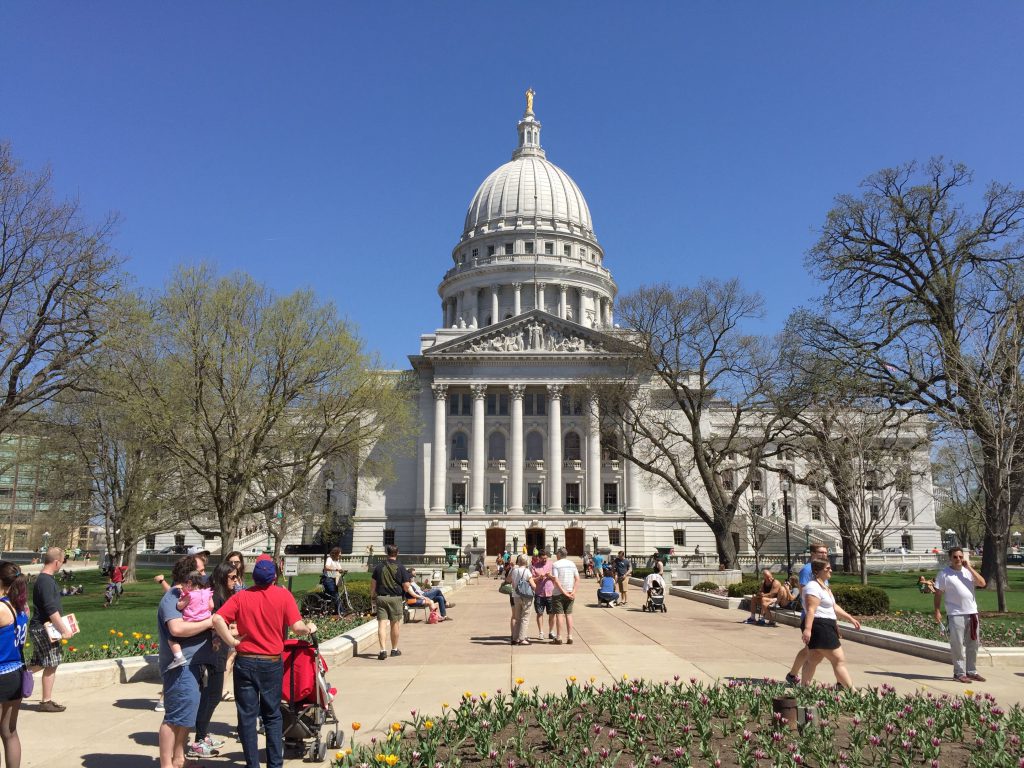Republican Legislators Push Tax Credits for Films Made in Wisconsin
Republican leaders had removed similar item from Evers' budget.
Wisconsin Republicans advocated on Tuesday for a bill to encourage filmmaking in Wisconsin through tax credits and a state film office. Another bill would declare that “gig workers” for app-based delivery services aren’t employees of a company.
During a Tuesday Senate Utilities and Tourism committee meeting, Sen. Julian Bradley (R-New Berlin) said SB 231 offers tax credits to encourage more films to be made in Wisconsin. Bradley described a recent movie called “Green and Gold,” about a fourth-generation dairy farmer in Wisconsin who is on the verge of losing his farm and makes a bet on the Green Bay Packers to help save it.
Bradley said the director of the film, Anders Lindwall, chose to make it in Wisconsin, but that decision meant a financial sacrifice as the director turned down a major studio offer to purchase his film. The studio wanted him to relocate production to Alabama — a state with film tax incentives.
“He turned down the offer to keep his project authentically Wisconsin,” Bradley said.
Wisconsin had a film incentive for a brief time in 2010 under former Democratic Gov. Jim Doyle, though the Republican-led Legislature discontinued that program just a few years later. Now, Wisconsin is one of only four states in the country without a film office and one of 13 without any film tax incentives.
The bill would create new tax credits including one for 30% of the total cost of the salaries paid to employees who reside in Wisconsin and work in Wisconsin, one for 30% of acquiring or improving property and one for 30% production costs paid by a company to produce a film, video, broadcast advertisement or television production. A person’s total credits would be capped at $1 million for a fiscal year. The bill would also create a new State Film Office housed in the Department of Tourism that would implement the tax credits.
Rep. David Armstrong (R-Rice Lake) said having the rate at 30% would put Wisconsin in the top tier of states offering film incentives.
“How many of you like me flinch when you see the Georgia peach logo in the credits after a movie or TV show?” Armstrong asked at the hearing. “Do we want Illinois or Minnesota or Georgia to poach productions that could just as easily be shot in Wisconsin?”
Bradley said the bill “aims to make Wisconsin competitive by attracting filmmakers and productions through meaningful incentives, which in turn support local businesses, job creation, and increased tourism. Simply put, it would encourage filmmakers like Mr. Lindwall to choose Wisconsin, bringing their stories and economic activity to our state.”
The bill has broad bipartisan support with cosponsors including Sens. Patrick Testin (R-Stevens Point), Chris Larson (D-Milwaukee), Romaine Quinn (R-Birchwood) and Brad Pfaff (D-Onalaska).
Sen. Melissa Ratcliff (D-Cottage Grove) expressed some concerns about whether the funding for the proposal would be included in the budget since it is not in the bill. Wisconsin lawmakers are in the progress of writing the next biennial budget and while Gov. Tony Evers included a similar proposal in his budget, it was pulled out along with more than 600 other items by Republican lawmakers on the committee.
“I have a motion to bring that back in,” Bradley told Ratcliff.
“But if we pass this bill, it does not include the funding?” Ratcliff asked.
“This bill does not have the funding. The funding would come through the budget… We’re going to fight real hard to try to get that funded,” Bradley said.
According to fiscal estimates, the cost to state revenues would be at max $10 million. The new office would require three new positions in the tourism agency and would cost about $199,300 in 2026 and $254,000 in 2027.
Film stakeholders testified in favor of the bill during the hearing.
Paulina Lule, a Milwaukee native and an actress who recently starred in the MGM+ series Emperor of Ocean Park and has been in other shows including The Good Place and Scandal, told lawmakers that the bill would help people who want to showcase Wisconsin as it is in real life.
Lule said she has a film she has been working on called Sherman Park, which is about the neighborhood in Milwaukee.
“I have had producers who have been interested in making this film as long as I make it not in Sherman [Park],” Lule said. “I don’t want to, and so this film has sat unfilmed for 10 years.”
Lule said she recently began shooting a short film version in the Milwaukee park and was proud to be able to include a shot of the neighborhood’s name on a sign. She said that making films in Wisconsin would be a powerful way to promote the state and encourage people to visit.
“Show off Racine. We can show off the real Green Bay, not just the Packers. There’s more to Green Bay than just the Packers as much as I love them,” Lule said. “You’re missing out on one of the broadest… ways of promoting the state is by having stories that are authentically about Wisconsin, made in Wisconsin… with actors in it that sound like they’re from Wisconsin.”
Michelle Maher, a River Falls movie theater owner, said that having movies filmed in the state would also provide an opportunity for local theaters. She noted that the movie Sinners, a vampire movie set in the Jim Crow South directed by Ryan Coogler and starring Michael B. Jordan, was filmed on-site in Clarksville, Mississippi.
“It was a town similar to the size of the town that I live in, River Falls,” Maher said. “Unfortunately, that town doesn’t have the movie theater that I have in my town… [Coogler and Jordan] got together and said, we are going to make sure this movie shows in this town, so they brought in a crew to be able to show that movie locally to the town that it was filmed at. What if there was a movie filmed in River Falls? Not only would I have a huge premiere for a regional area, I would have an annual event built in that would generate huge tourism opportunities and other ways to invent and reinvent that same wheel.”
Classifying ‘gig workers’ as non-employees
Lawmakers also considered SB 256, which would declare delivery drivers for app-based companies, including Uber and Doordash, are not employees of the company for the purposes of compensation insurance, minimum wage laws and unemployment insurance. The bill would allow “portable benefits” for those workers.
Bradley, the coauthor of the proposal, said the legislation is needed so that companies can provide benefits to workers without changing their “independent contractor” status. Under this type of benefit system, accounts are linked to a worker rather than the employer, meaning the benefits follow workers to other employment opportunities, and companies and workers would both be able to contribute.
“The gig economy is here to stay, and with it, the flexibility that many workers value and desire,” Bradley said. “Unfortunately, current laws prevent drivers from accessing crucial benefits. These include health care, paid leave and retirement savings. That’s the problem SB 256 aims to address. This legislation creates portable benefit accounts funded through contributions from the platforms based on drivers’ earnings. These accounts can be used by drivers to pay for a range of expenses, including health care, retirement, or coverage of loss of wages due to illness or an accident.”
Lawmakers have considered the proposal before, including last session. The bill passed the Senate but never came up for a vote in the Assembly.
The bill specifies that if an app-based delivery company doesn’t prescribe dates, times of day or a minimum number of hours during which someone must work; terminate the contract of the driver for not accepting a specific request for transportation or delivery service request; allow drivers to work for other companies; or restrict the driver from working in any other lawful occupation or business, then a driver is not considered an employee or agent of the company.
“Previous versions of this legislation have garnered bipartisan support, and that support is only growing,” Bradley said. “It’s time we modernize our policies to meet the realities faced by thousands of Wisconsin workers.”
Sen. Jeff Smith (D-Brunswick) said he found it “embarrassing, disappointing” that the committee was considering the proposal. He said there is an “independent contractor travesty in this country.”
“As an independent contractor, these workers know what they’re signing up for,” Rep. Alex Dallman (R-Markesan) said. “They understand that they’re on an independent contractor basis. They understand that they want to remain independent contractors.”
Katie Franger, public affairs manager for Uber, told lawmakers that flexibility is the “fundamental reason” people choose the company’s platform for work. She said that the legislation would fit with this by allowing workers to have flexibility in benefits as well.
“Portable benefits allow each individual to choose what truly matters to them, ensuring resources are directed where they’re most needed,” Franger said.
When Smith asked about why they couldn’t provide the benefits already, Addison DiSesa, legislative policy advisor for DoorDash, said “providing the benefits proactively jeopardizes the independence of these workers” and that the bill “empowers workers to get access to the benefits that they want while protecting their independence.”
Maliki Krieski, a Ripon mother and Doordash worker, told lawmakers that she supports the bill because she wants to keep the flexibility that is part of the work currently. She said it allows her to take care of her child, who has diabetes.
“Our state system is outdated…,” Krieski said. “The one thing that stands between us and any form of health care incentive, retirement plan… The only thing that stands between us and that is the state law.”
Stephanie Bloomingdale, president for the Wisconsin AFL-CIO, cautioned that the bill seeks to create an exemption to current law and could be harmful to workers, who depending on the situation might qualify for certain benefits. She also pointed out that it doesn’t require companies to provide access to any benefits.
“It exempts app-based delivery drivers from settled Wisconsin law concerning our workers compensation, minimum wage and unemployment insurance laws,” Bloomingdale said.
Bloomingdale noted that to be considered an “independent contractor,” when it comes to worker’s compensation, workers have to meet a nine-part test, otherwise a worker is automatically considered an employee. The bill would replace this with the four-part test, which she said would be quite “minimal.” She noted that depending on the situation some workers could potentially qualify for worker’s compensation.
A legislative council representative explained that “the default is that you’re an employee, and then there’s a nine factored test and that leads to a determination that you might be an independent contractor.” The bill, he said, would implement a “route that’s more streamlined for these app-based drivers.”
“We oppose the bill because it does not guarantee any more or less flexibility for workers. It does not guarantee good wages and it does not guarantee benefits for workers in the gig economy. It does none of these things because the bill eliminates employee status for these workers and all the rights that come with that status,” Bloomingdale said. “The bill does not guarantee or require that these tech giants provide any benefits, portable or fixed.”
Bloomingdale said the bill would instead just “create special exemption for these powerful corporations at the expense of Wisconsin’s working men and women” and called the bill a “slippery slope.”
“If this bill passes, we will be back here as those who do the bidding on international corporations come to this legislative body to similarly carve out a certain class of workers to evade state law and reclassify each group of workers one by one,” Bloomingdale said. “If these companies succeed in passing this bill, their low-pay, no-protection business model could expand in virtually every industry.”
Lawmakers want more films made in Wisconsin and hope tax credits will help was originally published by the Wisconsin Examiner.
If you think stories like this are important, become a member of Urban Milwaukee and help support real, independent journalism. Plus you get some cool added benefits.
Movies
-
Mystery Movie Being Filmed in Milwaukee With Kevin Spacey
 Apr 24th, 2025 by Jeramey Jannene
Apr 24th, 2025 by Jeramey Jannene
-
Two Documentaries Offer Lessons in Fame
 Apr 24th, 2025 by Dominique Paul Noth
Apr 24th, 2025 by Dominique Paul Noth
-
‘The Dells’ Is A Canny, Very Wisconsin Docu-Film
 Apr 17th, 2025 by Dominique Paul Noth
Apr 17th, 2025 by Dominique Paul Noth




















